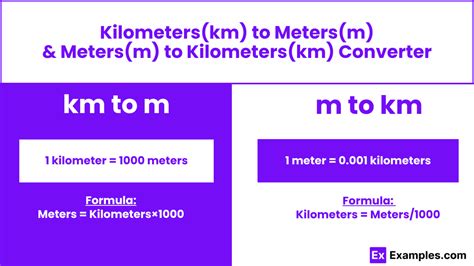How Many Kilometers to a Meter? A Simple Conversion Guide
Are you struggling to convert kilometers to meters? Don't worry, you're not alone! This simple guide will walk you through the conversion process and provide you with some handy tips to remember it easily. Understanding this conversion is crucial for various tasks, from calculating distances for travel to solving problems in physics and engineering.
Understanding Kilometers and Meters
Before we dive into the conversion, let's quickly review the units:
-
Kilometer (km): A kilometer is a unit of length equal to 1,000 meters. It's a larger unit used to measure longer distances like the distance between cities.
-
Meter (m): A meter is the base unit of length in the metric system. It's a smaller unit used to measure shorter distances, like the length of a room.
The Conversion: Kilometers to Meters
The key to converting kilometers to meters lies in understanding the relationship between the two units: 1 kilometer = 1000 meters.
Therefore, to convert kilometers to meters, you simply multiply the number of kilometers by 1000.
Formula:
Meters = Kilometers * 1000
Example:
Let's say you need to convert 5 kilometers to meters:
Meters = 5 km * 1000 = 5000 meters
So, 5 kilometers is equal to 5000 meters.
Tips and Tricks for Easy Conversion
-
Memorize the key relationship: Remember that 1 km = 1000 m. This is the foundation of the conversion.
-
Use a calculator: For larger numbers, a calculator can be helpful to avoid errors.
-
Visualize the conversion: Imagine a kilometer as a long road, and a meter as a small step along that road. It takes 1000 steps (meters) to cover one kilometer.
-
Practice: The more you practice conversions, the easier it will become. Try converting different kilometer values to meters to solidify your understanding.
Beyond the Basics: Meters to Kilometers
Conversely, if you need to convert meters to kilometers, you'll perform the opposite operation: divide the number of meters by 1000.
Formula:
Kilometers = Meters / 1000
Real-World Applications
Understanding this conversion is vital in many real-world situations:
- Mapping and Navigation: Converting distances between locations.
- Construction and Engineering: Calculating building dimensions.
- Sports and Fitness: Tracking distances run or cycled.
- Travel Planning: Determining travel distances.
Mastering the conversion between kilometers and meters is a fundamental skill with wide-ranging applications. By following these simple steps and practicing regularly, you'll quickly become confident in performing these conversions.
